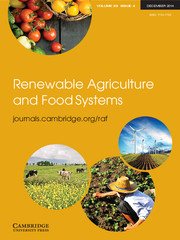Article contents
Community transformation through certified organic cotton initiatives—an analysis of case studies in Peru, Tanzania and India
Published online by Cambridge University Press: 08 January 2020
Abstract
This paper examines how certified organic cotton initiatives (COCIs) influence community capitals in rural Peru, Tanzania and India using the community capitals framework (CCF). Case study analyses, including qualitative interviews of farmers, expert interviews and participatory observations, were conducted in Northern Peru, Northern Tanzania and Eastern India. The results show slight changes in community capitals in Peru, while comprehensive changes and spiraling-up effects were triggered by certified organic cotton farming initiatives in Tanzania and India. These community developments strongly depended on set measures, such as the extent of (1) partnership (e.g., contract farming), (2) input support (e.g., seeds, loans, community infrastructure), (3) capacity building (through training and advisory services), (4) group formation and (5) formation of cooperatives. Favorable environmental conditions and supporting local institutions facilitated spiraling-up effects, while social preconditions (e.g., gender inequality) strongly limited these effects. The research showed that COCIs have considerable potential to trigger spiraling-up effects in rural communities. However, the capacity strongly depends on the respective initiative and its ability to involve and empower farmers, i.e., to build up human and social capital.
Keywords
- Type
- Research Paper
- Information
- Copyright
- Copyright © Cambridge University Press 2020
References
- 3
- Cited by



